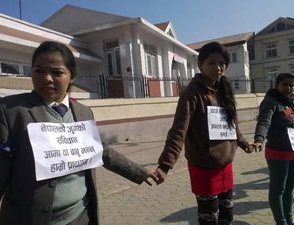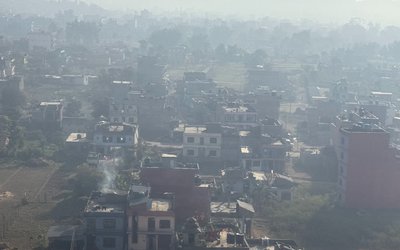
At a time when the new draft constitution is in the people’s court, three women leaders, two wives and a daughter of former prime ministers, are objecting to one of its clauses vehemently.
“A citizenship provision of the draft constitution is discriminatory and unacceptable to us,” thundered CA member Arju Deuba Rana, wife of former prime minister and Nepali Congress leader Sher Bahadur Deuba. “The provision discriminates women in citizenship.”
Hisila Yami, UCPN-Maoist leader and wife of former Prime Minister Dr. Baburam Bhattarai, has already treated it like a scrap in front of the party leaders. “This provision is unacceptable to us. It is inspired by the mentality of patriarchal society.”
Backed by hundreds of other women activists, three powerful women leaders are launching crusades against the provision. There is also the backing of Madheshi leaders, who are boycotting the public opinion collection program.
The new citizenship provision stipulates that a person can apply for citizenship through either of their parents, if both of them are Nepalis, which is regressive compared to the current provision in the Interim Constitution, which allows a child of a Nepali mother or a father to acquire the Nepali citizenship certificate by invoking descent.
In case of naturalized citizenship, a foreign male married to a Nepali woman would need to reside in Nepal for at least 15 years to become eligible to apply for Nepali citizenship, while a foreign woman married to a Nepali man can immediately apply for Nepali citizenship.
According to rights activists, Nepal will have more than 3 million stateless people in case the Constituent Assembly passes the constitution without changes.
“If political leaders are afraid of the open border, I would like to tell them that crossing the border does not entitle anyone to citizenship,” said senior advocate Sapana Malla. “If security is an issue, then why do they see children of Nepali daughters as threat, but do not fear those of a foreign woman married to a Nepali?”
The issue is of citizenship for a foreigner spouse of a Nepali citizen. An article in the draft Constitution states that a foreigner woman married to a Nepali man can immediately get the citizenship of the country provided she abandons the citizenship of her home country.
However, when a foreigner man marries a Nepali woman, he qualifies for citizenship only after 15 years of legal stay in Nepal. The initial proposal on this issue had a provision of seven years of compulsory legal stay for both the male and female foreigner spouse of a Nepali citizen to qualify for Nepali Citizenship.
Given the number of marriages that take place across the border in the Tarai, this was seen to be causing a practical problem. Many of the daughter-in-laws in the Tarai would remain officially foreigners in the country they have been married to. This consideration gave rise to the idea of separate clauses for the brides and the grooms marrying in to Nepal.
Senior Advocate Sapana Pradhan Malla said if the citizenship by descent was conferred on children on the basis of Nepali nationality of both the parents, as stated in Article 12 (1) of the draft constitution, also known as the ‘and’ provision, it could render some people stateless.
She said the ‘and’ provision ended the privilege of Nepali father who could transmit Nepali nationality to his children irrespective of his wife’s nationality till now.
Another flaw in this Article is that if a foreign woman married to a Nepali man refuses to obtain Nepali citizenship, their children will not be eligible to obtain Nepali citizenship by descent.
Senior Advocate Malla said there were provisions for naturalized citizenship for the children of Nepali nationals married to foreign nationals in certain conditions, but provision for naturalized citizenship could not be deemed a right but is merely a state’s discretion.
Regional parties are opposing Article 282 of the draft. According to the draft constitution, only citizens by descent can hold the post of the President, vice-president, prime minister, chief justice, Speaker, Chair of the Upper House, chief of the Pradesh, Chief Minister, speaker of the Pradesh Sabha and chief of the security agencies.
Nepali Congress CA member Ramesh Lekhak, who is also a member of the Constitution Drafting Committee, said the draft constitution intended to give naturalized citizenship to foreign women married to Nepali men and not to foreign men married to Nepali women but that was a worldwide practice.
This has been a great issue with the ongoing women’s movement for gender equality. This has definitely boosted the dignity of Nepali womanhood.
Citizenship is critical to exercise and enjoyment of the rights and privileges granted by the state. Nepal is one of 27 countries in the world (including Libya, the United Arab Emirates, Qatar and Sudan) whose laws and/or practices prevent women from passing citizenship rights to their children.
If the draft is sent to the CA without changes, Nepal will have more than 3 million people as stateless again.
- MELAMCHI WATER SUPPLY: No Interruption During Monsoon
- Jun 25, 2025
- KOREAN RETURNEES: Successful Integration
- Jun 25, 2025
- UPPER TRISHULI-1: Engaging With Local
- Jun 25, 2025
- IME GROUP: Twenty Five Years Of Journey
- Jun 24, 2025
- NEPAL’S AIR POLLUTION: A Growing Health Concern
- Jun 24, 2025















